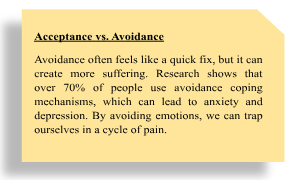“The problem with problem-solving is that it is a mode of mind that does not know when to stop.”
– Steven C. Hayes
Have you ever tried to avoid feeling uncomfortable, as in like stress, anxiety, or sadness? You might discover that the more you push away these feelings, the more they intensify.
This is the central concept of Acceptance and Commitment Therapy (ACT). ACT suggests that we should not struggle with our thoughts and feelings. Instead, it asks us to embrace them. Furthermore, it teaches us actions that will help us in living a meaningful life with values. Unlike other therapies that try to change the way we feel, ACT changes the way we react to our feelings and thoughts. That makes for growth in personality and well-being, even when things are getting tough.
What is ACT?
Acceptance isn’t about giving in or saying everything is okay. Rather, it’s about recognizing thoughts and feelings without judgment. It’s allowing ourselves to experience life as it is, not as we wish it to be.

ACT was developed by psychologist Steven Hayes in the 1980s. He used the concepts of mindfulness and behavior change. It’s not about reducing stress or anxiety symptoms but about helping you to live a full and meaningful life. And guess what? It works very well with people of all ages. Whether you have a young child having tantrums or a teenager feeling very stressed, ACT can provide useful tools.
According to Dr. Steven Hayes, “It’s not about being free of feelings; it’s about being free with them.” When we accept our experiences, we open the door to growth and transformation.
Key Processes of ACT: The Hexaflex
- Cognitive Defusion: “Let Your Thoughts Pass By”
Do not get caught up in your thoughts. Imagine them as if they are clouds passing by you. This process will help you focus on what is important and notice your thoughts without getting stuck in them. - Acceptance: “Make Room for Feelings”
Feelings aren’t something to fight against. Instead of pushing them away, allow yourself to feel them fully. By accepting difficult emotions, you make space for peace and clarity. - Mindfulness: “Be Here, Now”
Be present in the moment. Let go of distractions and focus on what’s happening right now, not what happened yesterday or what’s coming tomorrow. Mindfulness helps you connect with your life in real time. - Self-As-Context: “See Yourself from the Outside”
You are not your thoughts or feelings. Step back and see yourself as the observer. This wider perspective allows you to detach from self-judgment and get a sense of freedom. - Values: “Know What Matters Most”
What are you passionate about? Your values are your compass that navigates through the various issues in life. Knowing your values can help you make decisions that lead to a more meaningful and purposeful life. - Consciously Effective Action: “Act Towards What You Value”
Knowing your values is not enough; you need to act on them. Committed action is the intentional act of doing something, no matter how small, towards living the life you want, even when things get tough.
Why ACT for Your Child?

Some benefits of ACT for children are:
- Increased emotional strength: Children learn to deal with difficult emotions without getting overwhelmed.
- Better concentration: Mindfulness practice can improve the concentration of children both at school and at home.
- Value-based living: It helps children set goals which are aligned with what they value most.
- Behavioral flexibility: ACT teaches children to change their behaviors in different situations, which is an important life skill.
When You Might Want to Consider ACT Therapy?
- Anxiety Disorders: If your child is struggling with anxiety—whether it’s social anxiety, general anxiety, or specific phobias, ACT can help them confront those fears head-on and find control.
- Depression: ACT can help a child develop a healthier relationship with their feelings and can be a helpful adjunct in managing depressive symptoms.
- Behavioral Issues: Children who exhibit challenging behaviors may benefit from the strategies ACT offers, helping them to engage in more positive actions.
- Chronic Health Conditions: ACT has been shown to help kids with ongoing health issues by teaching them coping strategies and helping them focus on what matters.
- Life Transitions: Whether it’s starting a new school, moving, or experiencing family changes, ACT can guide kids through periods of uncertainty.
What to Expect in ACT Therapy Sessions?
- Check-in: The therapist may begin with a simple check-in to see how your child has been feeling and what challenges they have faced since the last therapy.
- Mindfulness Exercise: They can lead a brief mindfulness exercise to help your child connect with his or her feelings and thoughts.
- Insights and Discussions: Together, they will discuss any thoughts or feelings that are interfering with your child’s goals. This is the “diffusion” part where kids learn to look at their thoughts more objectively.
- Values Exploration: The therapist may challenge your child to discuss what is most important to them; this can be highly enjoyable and enlightening!
- Homework: Indeed, there might be homework. This may include practicing mindfulness in daily activities or setting a small goal that supports their values.

